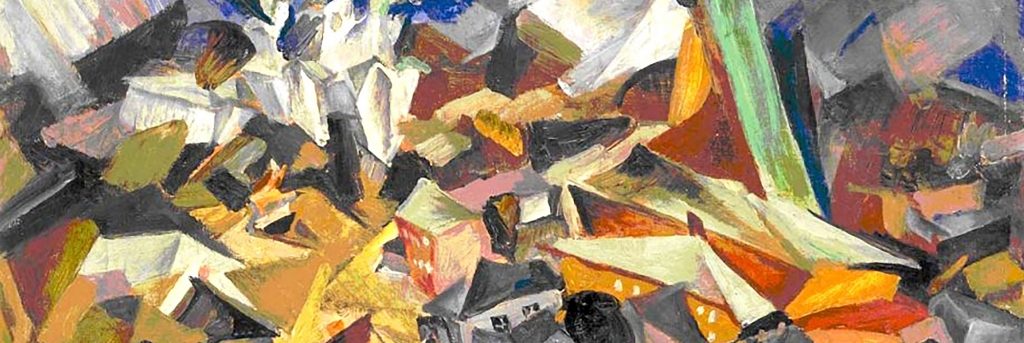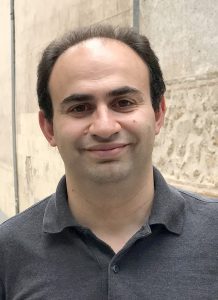Spring Seminar Series — Jewish Writers from 20th-Century Ukraine:
History, Memory, Narrative

“Town,” by Ukrainian-French-Jewish artist Issachar Ber Ryback, 1917. Via Wikimedia Commons.
April 22, May 6, & May 20, 2022 — 10:30 a.m. – 12:00 p.m.
Instructor: Sasha Senderovich, Assistant Professor, Jewish Studies & Slavic Languages and Literatures
Ukraine, which was subjected to an unprovoked military attack from Putin’s Russia in February 2022, has long been an important place in Jewish experience, history, and memory.
This online seminar series focuses on three key moments in the experience of Ukrainian Jews in the 20th century through the lens of literary fiction (short stories) and poetry:
Session 2. In the Midst of Pogrom Violence — following the revolution
Session 3. In the Shadow of the Holocaust — from the end of World War II to the present
Seminars will be discussion-based and highly participatory, and attendees should plan to read all of the materials in advance of each meeting. Sessions will be capped at 20 participants.
All readings are in English; readings for each session are 50-60 pages in length. Links to readings will be sent to registered participants in advance of each session.
Participants are welcome to register for one, two, or all three sessions.
Free and open to everyone. Offered online via Zoom. Questions? Email us at jewishst@uw.edu.
Session 1. In the Anticipation of the Revolution
Friday, April 22, 10:30 a.m. – 12:00 p.m.
- Session Readings
- Sholem Aleichem, “On Account of a Hat” (1913), translated by Isaac Rosenfeld
- Isaac Babel, “The Story of My Dovecote” (1925) and “How It Was Done in Odessa” (1923), translated by Val Vinokur; “The Awakening” (1931), translated by Boris Dralyuk
- Ilya Kaminsky, “Isaac Babel” (poem, 2004)
Session 2. In the Midst of Pogrom Violence
Friday, May 6, 10:30 a.m. – 12:00 p.m.
- Session Readings
- Isaac Babel, “The End of the Almshouse” (1920-1929), translated by Boris Dralyuk
- David Bergelson, “The Beginning of December 1918” (1922), translated by Joseph Sherman, and “Among Refugees” (1926), translated by Joachum Neugroschel
- Vasily Grossman, “In the Town of Berdichev” (1934), translated by Robert Chandler
Session 3. In the Shadow of the Holocaust
Friday, May 20, 10:30 a.m. – 12:00 p.m.
- Session Readings
- David Bergelson, “A Witness” (1946), translated by Harriet Murav and Sasha Senderovich
- Dina Kalinovskaya, “The Picture in the Teacup” (1986), translated by Harriet Murav and Sasha Senderovich
- Margarita Khemlin, “Shady Business” (2008), translated by Maya Vinokur
- Katja Petrowskaja, “Maybe Esther” (2014), translated by Shelley Frisch
- Julia Kolchinsky Dasbach, “Away from Babi Yar” and “Misremembering Stones” (poems, 2020)
Additional materials
Participants are also advised to acquaint themselves with some of the very recent — and publicly accessible — work about the current war in Ukraine through the lens of Jewish history, culture, and memory:
- This podcast with Dr. Amelia Glaser and Dr. Jeffrey Veidlinger – both experts on Ukrainian-Jewish relations and culture – about the war.
- This series of succinct entries on the war in Ukraine through the lens of Jewish history written by several scholars of Jewish history in Jewish Quarterly Review.
- This podcast episode with some of the contributors to the special issue of Jewish Currents on Soviet and post-Soviet Jews, on the Jewishness of Ukraine’s President Volodymyr Zelensky.
About the seminar series
Ukraine, which was subjected to an unprovoked military attack from Putin’s Russia in February 2022, has long been an important place in Jewish experience, history, and memory.
A birthplace of Hasidism and secular Yiddish literature, a land of some of the most brutal anti-Jewish violence after the Russian Revolution and of mass executions of Jews during the Holocaust, and a home to one of Europe’s most vibrant Jewish communities on the eve of the current war, Ukraine has long played an outsized role in the Jewish imagination.
This seminar series focuses on three key moments in the experience of Ukrainian Jews in the 20th century — the anticipation of the revolution at the turn of the century, the responses to violence that followed the Russian Revolution, and responses to the Holocaust from the end of World War II to the present — through the lens of literary fiction (short stories) and poetry.
All readings are in English; readings for each session are 50-60 pages in length. The syllabus draws on English translations from Russian, Yiddish, and German (including some texts available for the first time), and also on some of the contemporary English-language poetry by U.S.-based poets who emigrated as children from Soviet Ukraine.
About the instructor
 Sasha Senderovich holds a Ph.D. from the Department of Slavic Languages and Literatures at Harvard University (2010). His published work includes articles on Russian Jewish writers David Bergelson and Isaac Babel, as well as on contemporary English-language fiction by Russian Jewish émigré authors in the United States.
Sasha Senderovich holds a Ph.D. from the Department of Slavic Languages and Literatures at Harvard University (2010). His published work includes articles on Russian Jewish writers David Bergelson and Isaac Babel, as well as on contemporary English-language fiction by Russian Jewish émigré authors in the United States.
Together with Harriet Murav, he is the translator of the Yiddish writer David Bergelson’s “Judgment: A Novel” (Northwestern University Press, 2017) and, from Yiddish and Russian, of “In the Shadow of the Holocaust: Short Fiction by Jewish Writers from the Soviet Union” (under contract with Stanford University Press). His first book, “How the Soviet Jew Was Made,” is forthcoming (Harvard University Press, 2022).
In addition to his academic work, Sasha has published journalism and public scholarship in a wide range of publications, including Los Angeles Review of Books, the New York Times, Jewish Currents, and others (these articles can be found here). One of his additional regular activities involves summertime teaching as a faculty member of the Great Jewish Books program for high school students, in Amherst, Massachusetts.
